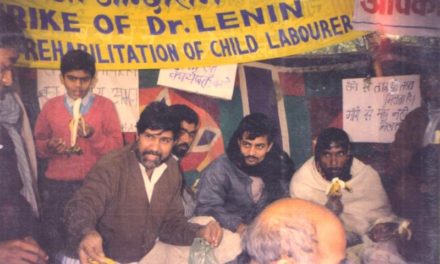The end of a modern slavery and human rights journey: Vale, slavefreetrade International.
The original text can be found HERE.
A little over 6 years ago, I woke up with the idea for an NGO called slavefreetrade that would test business and supply chains, with integrity and independence, and put a stamp of approval on them to generate sales and give good companies a foot up in their markets. It was a market-driven project to incite a shift from the current rapacious economy to a human rights-dependent one. We planned to harness the demand of consumers to drive corporate behaviour change. It all came down just (just!) to triggering and perpetuating a loop of slave-free demand between consumers and businesses.

This week, the decision was taken to close after battling for all of those years with as many as 400 volunteers at times, and the current 200 volunteers. Let me start by thanking those hundreds who joined us over the last 6 years, those who did support us, lent their advice and time, and provided skills and services to our work. It has been a genuine privilege to serve with you all, witness your commitment, and good faith, and the hope for a better world that brought you to us in the first place.
But, despite the best intentions, we struggled constantly to deliver. Of course, the buck for that absolutely stops with me. We failed to get things done that, in hindsight, probably were overly Quixotic and could never be done without the funds and full-time people. But we failed on really simple stuff, too. Mea culpa.
If you are interested in learning from other people’s experience, even if a failure, let me outline some of the things we learned along the way. And might even form the basis of a half-decent book! 🙂 IMHO, it is important for our team that I provide this small written legacy to feel those years are not wasted ones. We failed to break through the noise with a good project; so true that being a good idea or a compelling vision are far from being enough.

We learned a lot on the way, especially me. It started with the decision to take a non-profit path instead of a for-profit path. It was choosing the road less travelled, and it is less travelled for some very good reasons.
I learned not to be afraid of mistakes or failure: they are a given even if they do definitely set you back every time. But to summon the energy regardless to just keep going and change it up to learn from failings and mistakes. You won’t get rid of backward steps, they are ever-present, but
you can rise to the challenge to switch up a gear from one step forward, two steps back, to two steps forward and one back.
I learned that volunteering is much harder than it looks for keeping a social impact and technology organisation running. I also learned that the world is not ready for a demand-side initiative on human rights. It is going to take a great deal more of the demand-side conversation to get this going. The awoken community is as yet waaaay too small.
I learned that escaping Founder Syndrome in an organisation is a great deal harder than it looks or sounds. Even though I, as the dastardly culprit, tried to run as far and as fast as I could from it, we never escaped its drag, and it is an existential threat to a startup.
Some of our collective learning includes:
We learned that people with money might spend on social impact, but we also learned that they were really only interested in helping — beyond giving advice — a for-profit business and a 15% exit. A good cause or good idea does not in and of itself get funded.
We learned that keeping things moving forward, achieving against outcomes, in the face of constant volunteer churn, is a Sisyphean task that results in constant rebuilding, and rebuilding, and rebuilding. It drains. It demotivates. Churn over a long time destroys even the best intent.

We learned right at the end not to be afraid of closure. Maybe it should have come earlier; there were quite a few huge jolts, existential threats, and tempting moments. Or maybe we should still be pushing. Closing is not the outcome anyone wants from a project. But you should also not hit your head against the same wall time and again until all your best contributors are exhausted. Leaving is sometimes the wise choice.
As a human rights and modern slavery project we learned that the world remains without a universal human rights framework for measuring workplace conditions. We made one, but it as yet has not found its receptive place in the world. We established that human rights can be quantified. And that remote diagnostic tools can give the best picture of conditions — the “best evidence”, in legal terms — anywhere in the world.

We learned that people in workplaces are by far the best evidence for and arbiters of their conditions, but they are not routinely and comprehensively canvassed.
We learned that most people deeply want to talk to someone about their conditions.
We learned that there is a deep need for modern slavery to be addressed through a human rights lens, not a criminal justice one. And to recognise that modern slavery and human rights abuses are not aberrations in this world. On our watch, we have let our economy and capitalism be built on them.
We learned that every workplace has human rights issues, from gender pay gap to child labour. And that every workplace sits somewhere on a human rights continuum with modern slavery at one end and decent work at the other. And there are ways to work out quite precisely where.

In our B2B project, Libertas, we learned it is definitely possible to discover and map entire supply chains workplace by workplace. We learned we can use investigative techniques to remotely interview people. We can separate visibility from transparency to ensure complete human rights transparency while respecting commercial sensitivities. We learned it is possible to save millions of dollars for business in their compliance churn, jurisdiction to jurisdiction, by setting a single legal and policy compliance bar. We learned impact can be measured contemporaneously to ensure a net positive intervention. We learned we can build supply chains of companies where they not only start to collaborate around human rights, but their profitability becomes completely dependent on their shared human rights performance.
Making human rights and P&L co-dependent is absolutely the world we want to live in.
We also learned, and this might shock you, an overwhelming % of business, and an even greater % of NGOs, government agencies, and international organisations, are not interested in genuinely knowing, nor interested in substance and rigour, about their workplace conditions and supply chain conditions. It is still not clear to me if that is fear, ignorance, indifference, or all of these.
I think with governments, international orgs, and NGOs, it is a “holier than thou”, “beyond-reproach” conditioning; unfairly willing to demand it only of the private sector. I find it interesting that the same governments demanding corporate human rights due diligence don’t hold themselves to the same standard. The hypocrisy is clear; international organisations, governments, and NGOs, that put themselves out there as “holding company’s feet to the fire”, demanding better corporate behaviour, don’t do anything about their own position. Maybe it is too hard to hold someone’s feet to the fire when you are holding your own? We found businesses overall more likely, and increasingly so, to do some of the necessary. It is counter-intuitive, but definitely worth some soul-searching by international organisations, governments, and NGOs, especially those who work in the areas touched by modern slavery and human rights issues. Something comes to mind about glass houses and stones…
For the vast majority of organisations, we sadly learned that appearances are enough. The market is not ready for, or in need of, rigorous approaches. Vulgar risk assessment tools, that hurt as much as they help, are the sad gold standard right now. We learned that rigorous assessment absolutely can be brought to bear for small money as long as there is volume to make it work. But we learned that even that small price to pay for rigour in human rights monitoring is too much to ask.
A cuthroat world out there, the nonprofit world is far from genteel or collaborative. We learned time and again that our kindness and willingness to collaborate was often greeted with being cheated, extorted, stolen from, or just plain let down. We learned giving trust and getting a good outcome is possible, but needs to be incredibly selectively done. I guess that is a lesson for all of life, right?
We learned that when you come up with a new idea, that flies in the face of existing approaches, some people without the vision or courage will laugh at you. We learned that laughing stops, at some point, when it suddenly does look like a good idea. Those same people, though, are now almost certainly going to laugh at our closure. Perhaps they will even experience schadenfreude today.
But remember that naysayers and the unvisioned will laugh at your new idea. Persevere. Let their ridicule be drowned out by the crashing waves of your good intentions.
And eventually you will outpace their peals.

We learned that almost every organisation does say they care about other people’s human rights conditions but, yet, are not motivated to delve into their own. For the moment, we do see organisations are almost 100% more willing to cast the first stone than take a good hard look at themselves. I think and hope that will change. The sooner the better
We learned there is an exciting and growing interest in human rights in supply chains, but that sustainability really remains all about the environment. We did learn a wave is coming on business and human rights. But, very surprisingly, the vast majority of companies, especially multinationals, are spectacularly under-prepared for it. In denial, even. And, while we believe we are at the wavefront of business and human rights, the wave was just too far from breaking to sustain our insignificant NGO.

As a consumer project, our Freedomer work, we learned that a small but exciting – and growing! — % of consumers do say they care about human rights and modern slavery behind what they buy. We also learned, unfortunately, that most do not follow through on their values with their purchases. Again, that will change, I believe.
We learned a differentiator such as a label on a product can motivate people to direct their purchase, especially on slavery.
We learned that a slave-free label can drive as much as 100% consumer conversion on a wide range of products.
But we learned that the work required to get that into the market with integrity and rigour is not possible for a volunteer outfit with no cash.
We learned that the phenomenal volume of sustainability noise is overwhelming consumer ears, militating against breaking through.
It is also baffling, besting, and bebuggering (not a word, but you get the idea) businesses. We learned that breaking through that noise takes a flood of finance. ABBA were right; money, money, money.
As a technology project, we learned that technology community commitment to nonprofits, social impact causes, and volunteering, is actually rather skin-deep. Token, in-kind contributions designed more to lock in potential non-profit customers after the credits run dry aren’t very kind in-kinds. We will always earn the kudos of the naming rights for the term “Rightstech”, technology to promote and advance human rights. At least according to the Urban Dictionary. 🙂
We learned that, despite the best efforts of a small number of well-intended technology people, decent technology cannot be built without significant money and a promise of profit. We learned that it is not complex to design the technology needed to make a platform to deliver real-time human rights monitoring in global supply chains. But it costs. And bootstrapped volunteers alone cannot deliver it.

On the fundraising side, we learned very few fundraisers volunteer, and that big talk is both common and cheap. Also, we found that there are many showbags (colourful but full of crap) out there. We learned that the doors to those with money – high net-worth, family offices, etc – are not easily knocked. We learned grant applications are strongly hit and miss, extremely labour-intensive, almost never worth the inputs, and far from sufficiently widely available in contrast to the demand for them. We learned that funds, such as grants, go only into the status quo. Big funders in the “end modern slavery” world get their money from status quo donors, so it makes sense new ideas don’t emerge. That is a battle I underestimated; new ideas that go against the grain do not get supported. We also learned — although knew this already, of course — that donors don’t want to fund the running of an organisation, for it to exist in the first place, but will fund only its projects.

We learned that, quite incredibly, some people think volunteering is a form of modern slavery. Let’s agree to ignore such tangible stupidity.
Some consumers care about modern slavery. Some businesses care about human rights. And that care is growing. But it is only at the wavefront right now. We are 6 years ahead of the right time. Or maybe 10? Let’s see how the world moves in the next 4 years. 20 years ago when I set up a human trafficking consultancy, it was 20 years too soon as well, but everyone is sure going for it now. A Founder has got to somehow magically divine how long the wave will take to break, and not get on it too early. Being too far ahead of it means you will get dumped in the churn. How you make that assessment, if you are really obsessed with a vision, I have no advice. I could not do it. Only hindsight tells me we were (I was) wrong.
We definitely learned that this wavefront, and the growing concern about business and human rights, is just moving too slowly to keep a volunteer nonprofit waiting. As I learned in the army, waiting is demoralising. Bringing people to the solution without funding is bound to fail, eventually, because there is a limit to how long you can keep it going, how you can keep volunteers motivated, on the smell of an oily rag. At times, we were down to our last 50 bucks. And without deep pockets you cannot demand or really in any way drive demand for your services; it has to come to you.
Rise above the pedestrian and tawdry. If you have a big idea, don’t let thoughts of failure — or even ridicule from “peers” — stop you from starting. Big things start from someone who decided to go for it, regardless of what must be considered a very high risk of failure. Maybe the bigger the idea the bigger the failure, but once in a while your big idea will get a foothold, even if just in common consciousness. And that is more of a win than a failure, to my mind at least. And if you fail in this way, hold your head high, as our entire volunteer cohort can.
In the final analysis, the single biggest lesson I come away with is that while “Made in Freedom” should be a thing, it is not going to happen at this time, at any kind of scale, with the integrity it deserves, nor any time soon. But it will come, or we should not be able look ourselves in the mirror.

Vale, slavefreetrade International.

























